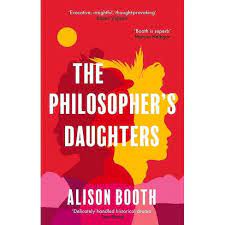The Philosopher’s Daughters (Red Door 2020) is an historical romance / drama novel by author Alison Booth. The story follows the lives of sisters Sarah and Harriet, from the Suffragette movement in London to 1890’s outback Australia.
It is love that beckons Sarah first to leave home and travel to the other side of the world; it is a tragedy that encourages Harriet to follow. Both women experience the harsh rural life of a country as alien to them as the moon. The deprivations and desperate conditions are an unexpected shock. The casual violence and racism, and the many injustices of outback life, are even more discomforting. They are women in a world of men and suffer many frustrations because of their gender. They are white people in a land belonging to ‘the blacks’, but it is the whites who hold the power and who decide how the land is ruled. The cruelty and dishonesty of the colonial system becomes obvious to both of them, particularly Harriet, who develops a friendship with an Aboriginal stockman that verges on (unrequited) romance, and as she devotes her time to capturing the stunning landscape through her paintings, she becomes more immersed in her new home and all it represents.
The narrative comes to a crescendo with murders at a nearby cattle station, and the sinister and brutal stationhand who is looking for revenge and his own kind of justice.
Booth’s writing is clear and well-researched. Her knowledge of the Australia of that time, and its culture and norms, is evident in the detail she writes onto every page, and her author experience is demonstrated by the skill with which the story takes shape. We are given chapters from both Sarah’s and Harriet’s perspectives. The dialogue is authentic and engaging. I love that each chapter begins with a line taken from that section: ‘Her resolve was fragile’; ‘You have a very forgiving nature’; ‘What on earth’s that thing she’s got on her head?’; ‘They give me a civilised name’.
This is a story about two strong women who empower themselves through their art, their grit, their courage and their ideals. While there is a strong romantic element, it is never saccharine. The increasing tension towards the end of the book makes for a page-turning read, as the stakes get higher and each sister must decide what is really important, and how far they are prepared to go for what they believe in. The epilogue is a lovely and satisfying resolution. This is historical fiction well anchored in researched fact, with themes of belonging, identity, love and sacrifice. And at the centre of it all, the terrible, cruel racism that typified that time; the greedy and destructive colonialism; the nuanced emotions of these women as they struggle against the prevailing views. Booth doesn’t shy away from the violence but she balances this with characters who really do wish to change their own attitudes and the environment in which they live.

